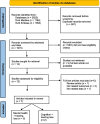Association of hearing loss with cognitive function and mental health in Africa: A systematic review
- PMID: 39856661
- PMCID: PMC11758725
- DOI: 10.1186/s12889-025-21548-3
Association of hearing loss with cognitive function and mental health in Africa: A systematic review
Abstract
Objective: To summarize the evidence for the associations between hearing loss and mental health and cognitive function in Africa.
Methods: This systematic review was prepared following the PRISMA guidelines. Cohort, case‒control and cross-sectional studies were considered for inclusion if they reported the prevalence of any mental health conditions or levels of cognitive functioning among persons with hearing loss/deafness in comparison to those without hearing loss. No age restriction was applied. Articles not published in English or not from the African subcontinent were excluded. The initial search yielded a total of 2,822 articles from electronic databases. After title, abstract and full-text screening, seven articles were found to be eligible, with a total of 2,761 participants across Africa.
Results: Five studies reported that hearing difficulties were significantly associated with an increased prevalence of poor mental health. Two studies reported on cognition, one on higher odds (2.22; 95%CI) of developing cognitive decline among persons with hearing difficulties than among those with normal hearing. The majority of studies were conducted among special populations (i.e., retirement homes and special schools), with most participants being female.
Conclusion: This study revealed an increased risk of mental health disorders and/or cognitive decline for people with hearing impairment in African populations. However, the number of relevant studies is small, and more research is needed to provide evidence for public health interventions across the continent.
Trial registration: PROSPERO-CRD42024520957.
Keywords: Africa; Cognitive decline; Hearing loss; Mental health; Systematic review.
© 2025. The Author(s).
Conflict of interest statement
Declarations. Ethics approval and consent to participate: Not applicable. Consent for publication: Not applicable. Competing interests: The authors declare no competing interests.
References
-
- World Health Organization. Deafness and hearing loss Geneva: WHO; 2023 [Available from: https://www.who.int/news-room/fact-sheets/detail/deafness-and-hearing-loss.
Publication types
MeSH terms
LinkOut - more resources
Full Text Sources
Medical


